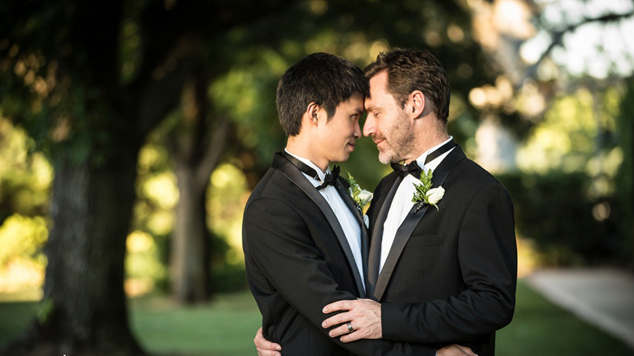
Ten years after John Howard put in place legislation specifying that marriage could only take place between opposite sex couples, the battle for marriage equality for LGBT couples continues to rage on. Across Australia, many same sex couples are holding wedding ceremonies to celebrate their relationships despite their unions not being recognized by the government. OUTinPerth spoke to Australian Marriage Equality’s National Director Rodney Croome and Deputy National Director Ivan Hinton-Teoh about the future of same sex marriage
Croome was recently awarded Tasmanian of the year in recognition of his work advocating for the rights of LGBTI Australians. “It’s a great honour to be named Tasmanian of the Year. It sends a really positive message about how much Tasmania has changed for the better.”
Croome says that a marriage equality victory is not as distant as it may seem. “We are closer than it seems. The Coalition still doesn’t have a conscience vote and we still aren’t sure if the numbers are there even with a conscience vote. These barriers to reform might seem formidable. But in my experience political resistance to a particular reform crumbles when it becomes clear that reform is inevitable. It is dawning on politicians that marriage equality will happen and some are consequently asking themselves, “why drag this out any longer?” We need people in their local electorates to be reinforcing this message.”
Having been advocating for LGBT rights for decades, Croome remains optimistic when he reflects on how popular opinion has changed. “The difference in 2015 from, say 2010-12 when debate was at its height is that the community debate is now essentially over. 72% of Australians are on side and there is majority support in every demographic, including people of faith and the elderly. The challenge now is to encourage supporters to make their views known to their local politicians.”
Deputy National Director Ivan Hinton-Teoh concurred, and had a profound experience after marrying his partner Chris in Canberra in 2013, before the High Court overturned legislation allowing same sex marriage in the ACT. The couple married in Canada in 2008, but felt that they should take the opportunity to marry on Australian soil. “When I proposed to Chris, and I did so without him knowing what I was planning on doing, I proposed to him in the press conference directly after the ACT passed the law with all the cameras and journalists there.” Hinton-Teoh said the public response was overwhelming. “I’m still staggered by the public reaction to it because Chris and I were approached by members of the community that we didn’t know. And I’m talking about the broader community, not the LGBTI community. We had strangers come up to us and hug us and shake us by the hand and congratulate us and tell us that they’re just so happy for us.”
Hinton-Teoh said the experience reinforced his motivation to continue fighting for marriage equality so that other couples could share that joy. “It is distinguishable gap in the life experience of LGBTI Australians where they are for their sexual orientation or gender identity denied the opportunity of celebrating their relationship among family friends. And the joy that I experienced and the sense of place that I felt in being able to do this among family, friends, neighbours, colleagues where I could walk outside of my house and feel equal to everyone around me. That novelty should not be a novelty shortly.”
The High Court overturned the legislation that briefly legalized same sex marriage in the ACT in 2013. Many same sex couples celebrate their relationships in wedding ceremonies despite their unions not being recognized as marriage by the government. “It’s very interesting because it goes to the heart of the history of marriage. Marriage actually pre-dates government intervention and legislation, it was a social contract between two people celebrated by their communities well before the church and the government got involved.” Hinton-Teoh said.
The activist still strives for legalization of same sex marriage so that couples can enjoy the support of a community that recognizes the dignity of their relationships. “We’re moving to a position where society recognizes the dignity of their relationship to a point, but they can see that there’s this one more step that’s yet to happen. We know of partners who’ve passed away before they’ve had the opportunity of celebrating their relationship in precisely the way they deserve, in precisely the way they should be entitled to.” Hinton-Teoh said. “When people are getting married it is a moment of joy, regardless of whether or not the federal government chooses to recognise their relationship.”
Sophie Joske
Image: Same Love Photography




